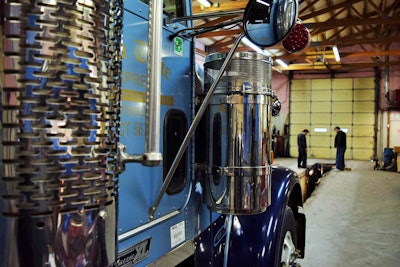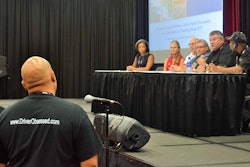
“I know a lot of people, and especially a lot of drivers, would like to cut my head off when I say this …” — that’s Mark White of Old Time Express, longtime owner-operator and operations manager now at his family’s Old Time Express small fleet, based in Hartsville, Tenn., with a preamble to some thoughts he delivers toward the end of this week’s Overdrive Radio podcast (in players above and below). And yeah, you might file this one under things people might not want to hear. Truth is, White and his brother, Mitch, and father, Bo, have been making electronic logs work for about four years now, following a switch undertaken in part to get out from inside the Conditional rating purgatory where the fleet found itself years ago now.
 Mark White
Mark WhiteI’ve told that story before, as regular readers will remember, as part of the 2014 CSA’s Data Trail series. How they’ve made it work: Among other things, Mark White and company have done something that won’t be in reach for many operators, though with some particular situations trailer-lease arrangements could make sense: expanding the use preloaded trailers on either end of drivers’ round trips where possible. The large majority of Old Time’s freight is direct-ship — nonbrokered — with some predictability of schedule.
Other things, however, are well within an owner-operator’s direct sphere of influence: from a focus on improving rates, generally, to compensate for time to close attention to collecting detention and adjusting hourly detention rates and policies with shipper customers and brokers. Mark believes it’s time for a new industry standard on detention pay. In the wake of the e-log transition the company made, they doubled the its hourly detention rate with its direct customers, from $50 to $100 an hour, after two free hours. That free time, to date the best we’ve seen of an industry standard, he’s cut in half with most of the brokers he uses, insisting on $100 an hour for detention after a single free hour when he can.
“Two hours has always been a standard,” he says. “That’s going to have to come down” to better make ELDs work if the mandate continues on track. “On any load – two hours loading, two hours unloading, that’s four hours you’ve lost. You’re going to lose some productivity going paper to electronic, but it’s not all on the trucking company. Shippers and receivers are going to have to understand that they play a bigger role in it than anybody.”
Old Time has at this point worked out the ELD kinks. Both Mark and his brother, Mitch, are hopeful that, provided the ELD mandate is implemented on the current timeline, conditions change further in all truckers’ favor, delivering more rate increases. Time will tell, and for what it’s worth Mark is more positive, however, on that score than Mitch, as you’ll hear. Take a listen:










